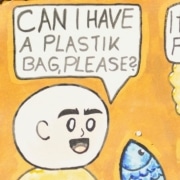What’s the deal with the Plastic Soup again?
March 15 2024 That’s what readers of news site nu.nl on their comment platform Nujij were wondering. In a recent […]
11 October 2021
Coca-Cola Nederland announced big news last year: in 2021 almost all its PET bottles, small or large, would be made of 100% recycled plastic. The time has now come. The company claims (in Dutch) that this will reduce its CO2 emissions by 42% and that no new plastic will be used (apart from for the bottle caps). They say that this will save 10,000 tons of virgin plastic every year. This is now feasible thanks to the recent introduction of bottle deposits on small bottles.
It sounds wonderful but the reality is that Coca-Cola’s plastic use worldwide is still going up and the company is the world’s biggest polluter.
To produce bottles using 100% recyclates, Coca-Cola is dependent on a high percentage of returned bottles. And this only happens where there is a bottle deposit system. Coca-Cola already sold drinks in 100% recycled bottles in Norway and Sweden, countries that have bottle deposit systems. Bottle deposits work. This shows that the one bottle in the range that is not made of 100% recyclate is the one exception. This bottle is Minute Maid (33 cl bottles). This drink is produced by Coca-Cola Belgium which currently does not have a bottle deposit system. This means that there is too little recyclate available in Belgium.
It is just one year ago that Coca-Cola, Pepsi, and Nestlé expressed their support for bottle deposits in all European countries. The trigger was the SUP-Directive which requires 90% of all bottles to be collected in the EU by 2029. In the rest of the world, Coca-Cola frequently opposes the introduction of bottle deposit systems, concluded Talking Trash, a report published last year by the NGO Changing Markets.
Hopefully, Coca-Cola will explicitly support the introduction of bottle deposit systems worldwide and no longer boycott them so that other countries too can attain higher percentages of recyclates. But even if this would be the case, the problem of plastic pollution is far from solved.
Coca-Cola, with over 500 brands, is the largest drinks producer in the world. It sells its products in countless countries where waste is not collected and is dumped on a large scale. For the third consecutive year, Greenpeace has named Coca-Cola the world’s biggest polluter according to records of waste items found during clean-ups. In the meantime, Coca-Cola is making all sorts of promises.
Coca-Cola has set a target that all its bottles worldwide must be made of at least 25% recyclable by 2025 and 50% by 2030. Last year, this was only 9.7%, states the Ellen MacArthur Foundation’s progress report. The Global Commitment Progress Report 2020 also states that Coca-Cola used more plastic in 2019 than in 2018 instead of less (2,982,421 tonnes of plastic compared to 2,970,289 tonnes).
Coca-Cola produces about three tonnes of plastic every year which equates to 200,000 bottles a minute. Each individual bottle may end up in the environment. To avoid this, Coca-Cola must change its thinking from selling drinks in separate plastic bottles to selling it in refill systems. But Bea Perez, Head of Sustainability at Coca-Cola said at the World Economic Forum (2020) in Davos that this would never happen. And this is incredibly bad news for the plastic soup and the world.
March 15 2024 That’s what readers of news site nu.nl on their comment platform Nujij were wondering. In a recent […]
The first Impact Fair is Europe’s largest Impact Experience. An interactive ‘immersive’ experience of impactful examples.
The waste-export to countries outside of the EU has been restricted The Netherlands is against a carpet ban on shipping of plastic waste.
The waste-export to countries outside of the EU has been restricted The Netherlands is against a carpet ban on shipping of plastic waste.

 “The earth is in need of a good lawyer” – Polly Higgins
“The earth is in need of a good lawyer” – Polly Higgins